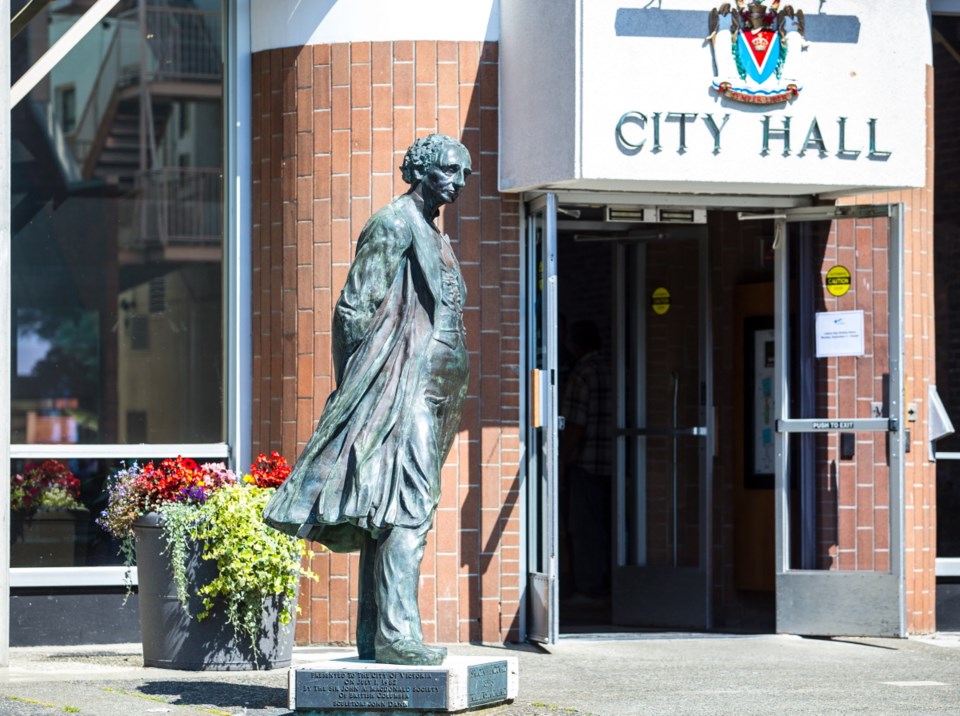Victoria residents are keen on the city saving money for future capital projects but not as hot on spending to hire new police officers, according to an online survey.
About 580 people filled out the city’s online survey as part of its 2018 budget consultation.
When asked how the city should allocate new property assessment revenue in 2018, the highest response (55.6 per cent) was: save for future infrastructure investment. About 44 per cent wanted the money used to reduce the proposed tax increase and 35 per cent favoured investing the money in new initiatives.
Asked how the city should allocate surplus revenue, 42.7 per cent said save for future investment; 9.43 per cent said invest in new initiatives and 47.8 said a combination of both.
Only 25.6 per cent believed police spending — 23 per cent of the city budget — was “just right.” That compared to 45.8 per cent who said it was too high; 14.6 per cent who thought it was too low and about 14 per cent who were unsure.
Mayor Lisa Helps noted the survey sample size was small and not necessarily representative of the community at large.
She said one of the factors influencing opinions about police spending might be that this is the first time the police have asked for a significant increase in several years.
“It’s not surprising the police are asking for more resources and people are going to have a response to that,” Helps said.
Chief Del Manak is proposing adding $2.5 million to the budget — a 4.76 per cent increase — to fund a variety of items. Those include six additional officers and two civilian staff, salary and benefit increases of $922,332, $76,800 in overtime costs, $160,000 in additional funding for policing special events and $143,668 for an intelligence unit.
The department, funded by both Victoria and Esquimalt, has 243 sworn members and just over 100 civilians with an annual budget in 2017 of $52.4 million.
“When an officer comes on shift, it used to be there were five or six calls holding and they could reasonably respond to it. Now when an officer comes on shift, there are between 20 and 25 calls holding,” Helps said.
Respondents were split on the proposed tax and utilities increase of 2.8 per cent in the draft financial plan, with 46.5 per cent in agreement but 45 per cent thinking it should be reduced. About 8.5 per cent said the increase should be higher.
Taxpayer satisfaction for services received from the city were somewhat tepid.
About 10 per cent of respondents said they were very satisfied with value received for their tax dollars; 38.1 per cent were moderately satisfied; 20.1 per cent were neutral; 14.8 were moderately dissatisfied and 15.85 were very dissatisfied.
“We do tend to hear from people with negative opinions. Generally, people don’t tend to write in and say ‘thank you I’m happy,’” Helps said.
“It’s something to pay attention to,” she said.
In various comment sections, many people voiced opposition to the city’s separated bike lane network project.
Helps said the response is to be expected but the bike lanes are needed for future growth.
“We are going to have 10,000 new people living in the downtown in the next 10 to 15 years. If each one of those people brings a car with them because they feel they have no other option, we are going to have automatic gridlock,” Helps said.
“The bike lanes are forward-looking infrastructure to accommodate the growth in the city and I completely understand that people don’t get that,” she said.
Helps said initial backlash against the bike lanes is normal and occurs in every city where they are introduced.
“Then five years from now, it becomes a normal part of the transportation infrastructure and we start to see the mode shift,” she said.
Within the capital budget section of the survey, respondents were asked to rank key areas of spending. The three top funding priorities were sanitary and stormwater sewers and waterworks, active transportation, and parks.
Of those responding, about 56 per cent said they own property, 41 per cent said they are renters and about 18 per cent said they owned or operated a business in the city.
The survey was just one element of the city’s budget consultation. The city also held events such as a town hall that included online participation, and publicized the budget proposals in advertising, pamphlets and through a video, the city newsletter, an e-newsletter, online and through social media.



